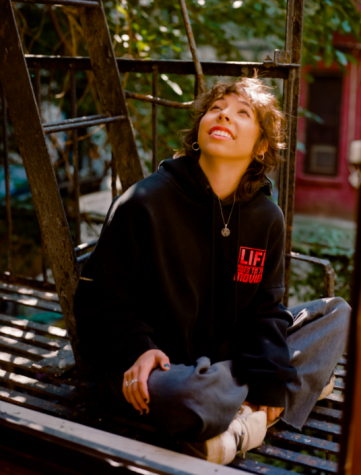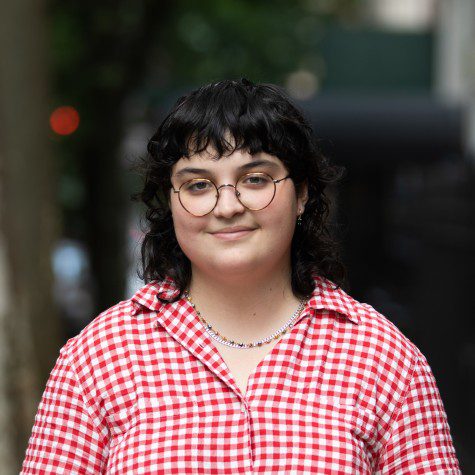Stella Smyth is the electro-pop artist you need to watch
After a somewhat rocky start on TikTok, this Clive Davis student is making a name for herself through her exquisite and introspective hyperpop.
As a musician with a growing TikTok fanbase, Stella Smyth has been gaining attention for her unique songwriting and production style. (Photo by Rhianydd Hylton)
October 22, 2021
Singer-songwriter-producer Stella Smyth blew up on TikTok — not because people loved her music, but because they hated it. In fall 2020, the NYU student posted teaser clips of her single, “Bored,” ahead of the release of her album, “Everest.” The song’s chorus, “And in my head I went / Fuck / I-I-I-I was just bored,” became the soundtrack to hundreds of TikTok videos, some positive, but most negative. Listeners left hate comments on Smyth’s since-deleted TikTok video where she first promoted the song.
Despite people’s distaste for the song, “Bored” has since accumulated over 229,000 streams on Spotify. Ultimately, Smyth didn’t mind the negative comments.
“[It’s] one of the most honest songs I’ve ever fucking written,” she said. “You don’t have to like it, but that means I don’t have to hide any part of myself now.”
Not only did the song offer Smyth creative liberty, it also gave her a growing fanbase, which she fondly refers to as “the Stelletos.”
“I still talk to them every day. We have a Discord server. They’re like my best friends,” Smyth said. “They have a fucking Linktree [to my music] in their bio and stuff.”
Smyth is a fangirl herself. When I asked how she got into writing and who her influences were, one name came up repeatedly: Taylor Swift.
“I started making music after I really fell in love with ‘1989’ by Taylor,” Smyth said. “I was 13 when that record came out. It was such a genre-defining record. I was watching the ‘The 1989 World Tour’ [documentary] this morning.”
TikTok commenters deemed “The Bluffs” — Smyth’s next release following “Everest” — to be Swift-esque. Over a gentle and floating acoustic guitar, tambourine hits, hand claps and Smyth’s signature synth flourishes, she sings, “And I found somebody else / And it might have been the realest thing I’ve ever felt.” The song’s soft acoustic production is a noticeable shift from the gritty electronic sound that defined “Everest.”
Smyth’s songwriting and production process is somewhat unconventional. Many songwriters, producers and artists start with one component — a beat, chords and melody, or lyrics — before putting everything together. Smyth doesn’t operate like that.
“I view production and songwriting as one and the same,” she said. “I feel like they both aid each other and they’re both moving parts of the same organism. I’ll be writing a melody for a synth part or something and then I’ll hear a melody for the lead vocal.”
Smyth used this writing and production style for “Everest.” With few distractions during the pandemic, Smyth holed up in her house in Los Angeles for three months, rarely seeing or talking to anyone.
“Every day I would wake up, write a song, mix and master it the next day and then write another one and another one,” she said.
The concept for “Everest” came from “227,” a song off of her previous EP, “Vienna.”
“There’s this lyric,” Smyth said. “And it was like, ‘I saw a hammer / It was bedazzled and I was enamored / And I bought it cause if I hit myself with it enough / Maybe I’d become someone else.’” This bedazzled hammer imagery formed the basis of “Everest” — in the album’s cover art, Smyth wields it, staring straight into the camera. She stands against a backdrop of dark mountains and an unnaturally saturated blue sky, with the sun peeking out from behind. I asked Smyth what the hammer represented.
“I feel like at a certain point in my life, I was really untapping the potential to do more harm than good,” Smyth said. The hammer was a metaphor for this stage in her life. It was a weapon, and only she could decide how to use it. I would say that using it as the concept for “Everest” was a good decision.
Since the release of “Everest” and “The Bluffs,” Smyth has garnered recognition beyond TikTok. She recently won the Music Forward Foundation’s LGBTQ+ Emerging Artist Award. As a result, she received $10,000, watched H.E.R. perform and was on the TODAY show. She said she put the money towards new music.
“I filmed three music videos this summer and also got an OP-1, which is in my bag right now,” Smyth said. “I have not been able to stop fucking with [it]. Yeah. Good shit.” For non-music nerds, an OP-1 is a portable synthesizer, sampler and controller that usually goes for over $1000. It produces quirky, electronic and often ethereal sounds.
I wondered if Smyth believed queerness to be an important part of her songwriting and artistry. Without missing a beat, she answered yes.
“It’s really integral to [one’s] identity,” she said. “I feel like listening to queer musicians’ work speaks to me on a level that not a lot of other things do. In terms of my queerness, my identity, my music, the Stelletos are honestly giving me a chance to be the person that I feel like I needed when I was growing up.”
The artist also strives toward equality in places other than her music. In 2020, she founded the club Producers Against Misogyny with her classmate, Lily Oppenheim. Smyth and Oppenheim are both students at the Clive Davis Institute of Recorded Music. Smyth recalled how the idea for the club was formed.

“Lily and I were just complaining about how there have been so many times where I’ve talked to male producers and someone’s sitting right next to me and I’m asking them like, ‘Oh, what’s your favorite plugin?’ And they actively ignore me and ask the same question to the guy next to me,” Smyth said. “They’ll make sure that I don’t have room [at the console], make backhanded comments, not want to work with me or degrade my work because of my various intersections of identity.”
Thus, they founded PAM, so that Clive Davis students could talk about production in a safe space that centers the conversation on marginalization. The club has only been active for a year, but they have already held events with successful musicians such as Jacob Collier, Weyes Blood and Jack Antonoff.
On hosting events at PAM, Smyth said, “The music industry is terrible, you know, but I think there are things that we can all do to actively combat that.”
Smyth was secretive about her upcoming projects, but shared that her new music had a quirky sound. “I judge it based off how much I can understand it. When I listen back and have no idea what I’ve just made, I kind of like it.”
Since our interview, Smyth has released a single titled “Everything.” It’s a hyperpop track that recalls Charli XCX and Caroline Polachek, two of Smyth’s influences. Drums scatter and bass crunches as Smyth — intentionally drenched in autotune — sings, “Onomatopoeia, do I really wanna see ya / Do I really wanna be okay? / Why would I drag the knife on the scar? / I’m a little tipsy, think I’m seeing stars.” Smyth runs through these melodies quickly, and as she crescendos, there’s no doubt this section is the apex of the song.
Regarding her new music, Smyth told me, “I feel like I have a lot of things to say, and I’m not going to say them quietly.”
Upon hearing “Everything,” it’s clear she means it. Stella Smyth’s music is available on all major streaming platforms.
Contact Yas Akdag at [email protected].

























































































































































